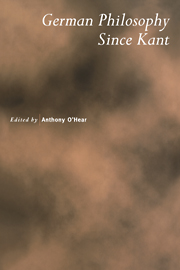Book contents
- Frontmatter
- Contents
- Preface
- Notes on Contributors
- Fichte and Schelling
- Hegel's Critique of Foundationalism in the ‘Doctrine of Essence’
- Schopenhauer's Pessimism
- Karl Marx
- Nietzsche's Virtues: A Personal Inquiry
- Bolzano, Brentano and Meinong: Three Austrian Realists
- Vorsprung durch Logik: The German Analytic Tradition
- German Philosophy of Mathematics from Gauss to Hilbert
- The Revolution of Moore and Russell: A Very British Coup?
- Husserl's Concept of Being: From Phenomenology to Metaphysics
- Frege and the Later Wittgenstein
- Otto Neurath, the Vienna Circle and the Austrian Tradition
- Does the Nothing Noth?
- Reactionary Modernism
- Adorno on Disenchantment: The Scepticism of Enlightened Reason
- Habermas, Science and Modernity
- German Philosophy Today: Between Idealism, Romanticism, and Pragmatism
- The Career of Aesthetics in German Thinking
- Hermeneutic and Analytic Philosophy. Two Complementary Versions of the Linguistic Turn?
- Index of Names
Hegel's Critique of Foundationalism in the ‘Doctrine of Essence’
Published online by Cambridge University Press: 29 September 2009
- Frontmatter
- Contents
- Preface
- Notes on Contributors
- Fichte and Schelling
- Hegel's Critique of Foundationalism in the ‘Doctrine of Essence’
- Schopenhauer's Pessimism
- Karl Marx
- Nietzsche's Virtues: A Personal Inquiry
- Bolzano, Brentano and Meinong: Three Austrian Realists
- Vorsprung durch Logik: The German Analytic Tradition
- German Philosophy of Mathematics from Gauss to Hilbert
- The Revolution of Moore and Russell: A Very British Coup?
- Husserl's Concept of Being: From Phenomenology to Metaphysics
- Frege and the Later Wittgenstein
- Otto Neurath, the Vienna Circle and the Austrian Tradition
- Does the Nothing Noth?
- Reactionary Modernism
- Adorno on Disenchantment: The Scepticism of Enlightened Reason
- Habermas, Science and Modernity
- German Philosophy Today: Between Idealism, Romanticism, and Pragmatism
- The Career of Aesthetics in German Thinking
- Hermeneutic and Analytic Philosophy. Two Complementary Versions of the Linguistic Turn?
- Index of Names
Summary
It is a commonplace among certain recent philosophers that there is no such thing as the essence of anything. Nietzsche, for example, asserts that things have no essence of their own, because they are nothing but ceaselessly changing ways of acting on, and reacting to, other things. Wittgenstein, famously, rejects the idea that there is an essence to language and thought – at least if we mean by that some a priori logical structure underlying our everyday utterances. Finally, Richard Rorty urges that we ‘abandon … the notion of “essence” altogether’, along with ‘the notion that man's essence is to be a knower of essences’.
It would be wrong to maintain that these writers understand the concept of essence in precisely the same way, or that they are all working towards the same philosophical goal. Nevertheless, they do share one aim in common: to undermine the idea that there is some deeper reality or identity underlying and grounding what we encounter in the world, what we say and what we do. That is to say, they may all be described as anti-foundationalist thinkers – thinkers who want us to attend to the specific processes and practices of nature and humanity without understanding them to be the product of some fundamental essence or ‘absolute’.
- Type
- Chapter
- Information
- German Philosophy since Kant , pp. 25 - 46Publisher: Cambridge University PressPrint publication year: 1999
- 1
- Cited by

